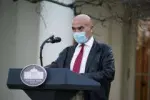Sen. Ted Cruz (R-TX) has pledged, pending acceptance of the case by the Court, to make oral arguments to the Supreme Court in a case brought by Republican candidates in Pennsylvania that challenges the state’s November elections as unconstitutional due to unlawful changes in the rules for absentee ballots through Act 77 enacted in 2019.
 File screen image.
File screen image.
The case was brought by lead plaintiffs Rep. Mike Kelly (R-PA) and GOP Congressional candidate Sean Parnell. While filed by candidates for lower offices, the case has repercussions for the presidential election that could invalidate the results in favor of President Trump.
Cruz is well familiar with the Supreme Court, having clerked for Chief Justice William Rehnquist in 1996 and arguing nine cases before the Court during his tenure as Texas solicitor general from. Cruz was also an attorney for the presidential campaign of George W. Bush for the 2000 Florida recount cases that went to the Supreme Court.
Cruz issued a statement to Fox News on Monday about his pledge. He then posted his statement online:
TRENDING: BREAKING HUGE: Major National Security Issue Identified Related to China’s Connection to Dominion Voting Machines
“Petitioners’ legal team has asked me whether I would be willing to argue the case before #SCOTUS, if the Court grants certiorari. I have agreed, and told them that, if the Court takes the appeal, I will stand ready to present the oral argument.”
If #SCOTUS grants cert in the PA election case, I have told the petitioners I will stand ready to present the oral argument.
Full statement below… pic.twitter.com/EnHxjqGR5K
— Ted Cruz (@tedcruz) December 7, 2020
Petitioners’ legal team has asked me whether I would be willing to argue the case before #SCOTUS, if the Court grants certiorari. I have agreed, and told them that, if the Court takes the appeal, I will stand ready to present the oral argument.
— Ted Cruz (@tedcruz) December 7, 2020
Plaintiffs-appellants petitioned the Supreme Court last Thursday for an injunction pending certiorari.
Excerpt:
QUESTIONS PRESENTED
1. Do the Elections and Electors Clauses of the United States Constitution permit Pennsylvania to violate its state constitution’s restrictions on its lawmaking power when enacting legislation for the conduct of federal elections?
2. Do the First and Fourteenth Amendments to the U.S. Constitution permit the dismissal of Petitioners’ claims with prejudice, on the basis of laches, where doing so foreclosed any opportunity for Petitioners to seek retrospective and prospective relief for ongoing constitutional violations?
Plaintiff Sean Parnell posted about Cruz’s and also posted a video clip of Mark Levin explaining the lawsuit, “It’s an honor to have Senator @tedcruz on our team & in the trenches in defense of our Constitution”
It’s an honor to have Senator @tedcruz on our team & in the trenches in defense of our Constitution. 🇺🇸 https://t.co/hIDp5PsjJD
— Sean Parnell (@SeanParnellUSA) December 7, 2020
A perfect summary of our lawsuit by @marklevinshow.
It’s filed with the US Supreme Court now.
We are fighting like hell to make sure that elections in #Pennsylvania are conducted in accordance with the Constitution.
Watch this.
pic.twitter.com/g0ct1XiClT— Sean Parnell (@SeanParnellUSA) December 7, 2020
Cruz issued a statement December 1st calling on the Supreme Court to take up the Pennsylvania Case.
“Today, an emergency appeal was filed in the U.S. Supreme Court challenging the election results in Pennsylvania. This appeal raises serious legal issues, and I believe the Court should hear the case on an expedited basis.
“The Pennsylvania Constitution requires in-person voting, except in narrow and defined circumstances. Late last year, the Pennsylvania Legislature passed a law that purported to allow universal mail-in voting, notwithstanding the Pennsylvania Constitution’s express prohibition.
“This appeal argues that Pennsylvania cannot change the rules in the middle of the game. If Pennsylvania wants to change how voting occurs, the state must follow the law to do so.
“The illegality was compounded by a partisan Democrat Supreme Court in Pennsylvania, which has issued multiple decisions that reflect their political and ideological biases. Just over a month ago, Justice Alito, along with Justice Thomas and Justice Gorsuch, wrote-correctly, I believe-concerning the Pennsylvania court’s previous decision to count ballots received after Election Day, that ‘there is a strong likelihood that the State Supreme Court decision violates the Federal Constitution.’
“In the current appeal, the Pennsylvania Supreme Court dismissed the claim based on a legal doctrine called ‘laches,’ which essentially means the plaintiffs waited too long to bring the challenge. But, the plaintiffs reasonably argue that the Pennsylvania Supreme Court has not applied that doctrine consistently and so they cannot selectively enforce it now.
“Even more persuasively, the plaintiffs point out that the Pennsylvania Supreme Court has also held that plaintiffs don’t have standing to challenge an election law until after the election, meaning that the court effectively put them in a Catch-22: before the election, they lacked standing; after the election, they’ve delayed too long. The result of the court’s gamesmanship is that a facially unconstitutional election law can never be judicially challenged.
“Ordinarily, the U.S. Supreme Court would stay out of election disputes, especially concerning state law. But these are not ordinary times.
“As of today, according to Reuters/Ipsos polling, 39 percent of Americans believe that ‘the election was rigged.’ That is not healthy for our democracy. The bitter division and acrimony we see across the nation needs resolution. And I believe the U.S. Supreme Court has a responsibility to the American people to ensure that we are following the law and following the Constitution. Hearing this case-now, on an emergency expedited basis-would be an important step in helping rebuild confidence in the integrity of our democratic system.”







